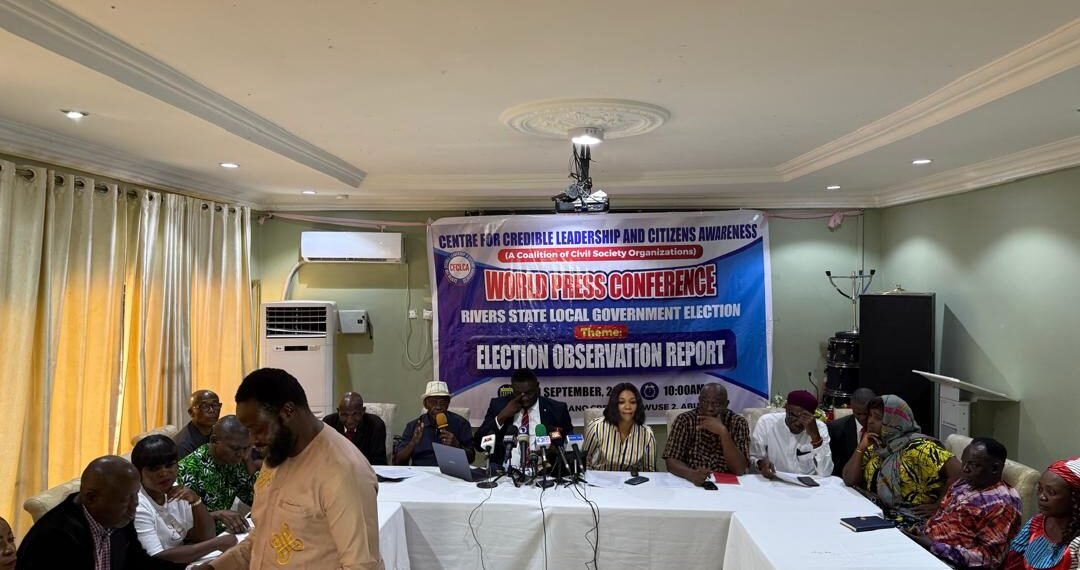A coalition of 30 civil society organizations and non-governmental groups has declared the recently concluded Rivers State local government elections free, fair, transparent, and credible.
The coalition, operating under the umbrella of the Centre for Credible Leadership and Citizens Awareness (CCLCA), was accredited by the Rivers State Independent Electoral Commission (RSIEC) to monitor the elections held on August 30, 2025.
Presenting the coalition’s pre- and post-election report in Abuja, the Director General of CCLCA, Dr. Gabriel Nwambu, described the polls as a landmark achievement for Nigeria’s democracy. He noted that the election, conducted under a tight timeframe and amidst extraordinary circumstances, still managed to meet both national and international standards of credibility.
Dr. Nwambu recalled that the elections came on the heels of the Supreme Court’s nullification of the previous polls. Following this ruling, the Federal Government declared a state of emergency in Rivers State in line with Section 305 of the 1999 Constitution (as amended) and the Emergency Powers Act of 1961.
The proclamation mandated RSIEC to organize fresh elections within just 30 days—a timeline many observers considered nearly impossible for an exercise of such scale.
“An election of this magnitude, covering 8,616 polling units, 319 wards, and 23 local government councils, would ordinarily take the nation’s electoral body at least one year to prepare for. Yet, under the exemplary leadership of RSIEC Chairman, Dr. Michael Odey, and his commissioners, the task was accomplished in record time,” Nwambu explained.
The coalition’s report highlighted significant improvements during the pre-election period compared to previous exercises:
Issue-based campaigns: Both the People’s Democratic Party (PDP) and the All Progressives Congress (APC) ran campaigns focused on policies and manifestos, rather than personal attacks. Observers commended this as a welcome departure from the past.
No violence or intimidation: Unlike previous elections marred by tension, this poll was preceded by calm. Citizens were able to go about their normal activities without fear.
Flawless logistics: RSIEC ensured timely and secure movement of both sensitive and non-sensitive materials from headquarters to local government areas, registration area centers (RACs), and polling units—including hard-to-reach riverine communities.
On election day, the coalition deployed 830 trained observers across the state, who monitored the process in real-time and submitted detailed reports.
Read also:
- Wike hails Tinubu for lifting emergency rule in Rivers, warns ‘fifth columnists’ against crisis politics
- Democracy in Nigeria dying, serving only politicians Peter Obi warns
- Delta Govt Hosts Second Edition of “Rhythm of Delta” Festival
Their findings included: Early commencement of voting: Accreditation and voting started between 8:30 am and 9:30 am in most polling units.
Orderly process: Voters were accredited and cast their ballots smoothly, with minimal delays, reflecting the effective training of ad-hoc staff.
Strong voter turnout: Although initial turnout appeared low in commercial districts, participation increased significantly as the day progressed.
Absence of malpractice: For the first time in recent Nigerian electoral history, observers recorded zero cases of vote buying, thuggery, ballot box snatching, or intimidation.
Professional security conduct: Security personnel were praised for being friendly and non-intrusive, maintaining peace without harassing voters or observers.
Prompt payment of staff: RSIEC was also commended for promptly paying ad-hoc staff, a move that boosted morale and prevented grievances.
“What we witnessed on August 30 was a watershed moment for Nigeria’s democracy. The election was peaceful, credible, and an example of what electoral management should look like,” Dr. Nwambu declared.
Perhaps the most striking aspect of the Rivers LG polls was the outcome. In a surprising result, the opposition APC secured 20 chairmanship seats, while the ruling PDP won just 3.
Observers noted that this result was a powerful demonstration of democracy at work, showing that incumbency influence did not distort the will of the people.
“This result speaks volumes about the credibility of the process. It was democracy in action, and the people’s votes truly counted,” the CCLCA report emphasized.
Following their assessment, the coalition made strong recommendations: National adoption of RSIEC’s model: The group urged the Independent National Electoral Commission (INEC) to adopt the methods deployed in Rivers as a blueprint for credible elections across Nigeria.
Sustain issue-based politics: Political parties nationwide were advised to emulate the issue-driven campaigns seen in Rivers.
Replication of professionalism: The conduct of security agencies and RSIEC staff was described as a standard that should be sustained in future elections.
Concluding their report, the coalition reaffirmed their position: “We hereby make this solemn proclamation: The August 30, 2025, Rivers State Local Government Elections actually held across 8,616 polling units, 319 wards, and 23 councils. This election was transparent, free, fair, credible, and consistent with the laws of the Federal Republic of Nigeria,” Dr. Nwambu said.






